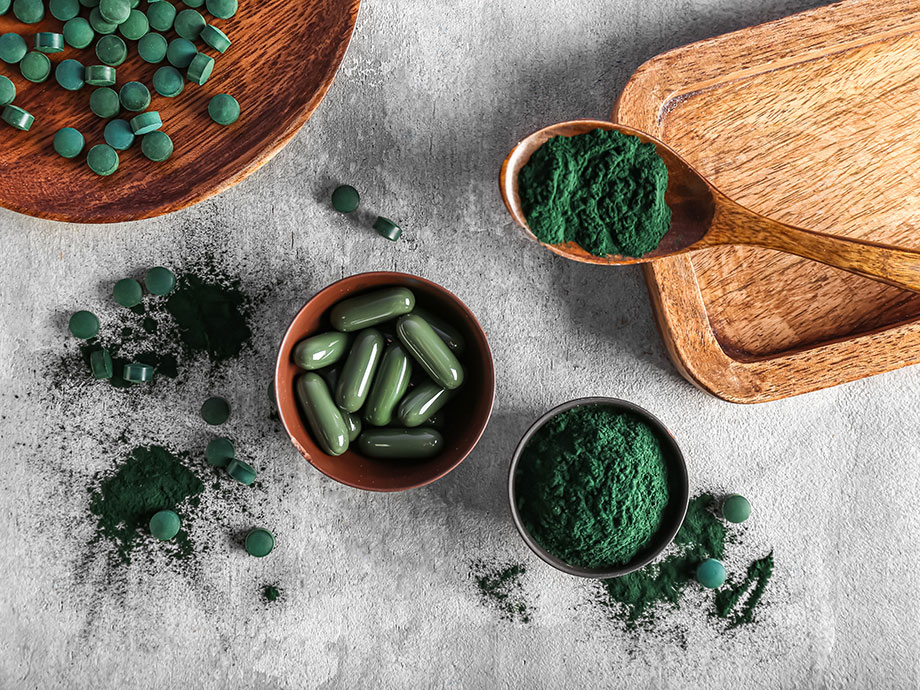We test and review fitness products based on an independent, multi-point methodology. If you use our links to purchase something, we may earn a commission. Read our disclosures.
Spirulina pops up in many multi-ingredient supplements, from greens powders to immunity boosters. It’s available in powder form, tablets, capsules, liquid, or flakes that you can sprinkle right on your meal.
But what is this “superfood,” exactly? And should you be taking it? Here, I—a functional nutritionist—will discuss all the benefits of spirulina, plus any potential side effects you need to know about.
Read on and see(weed) what spirulina can do for you!
Medical disclaimer: This article is intended for educational and informational purposes only. It is not intended as a substitute for medical advice. For health advice, contact a licensed healthcare provider.
What Is Spirulina?
First, let’s start with the basics. Spirulina (or Arthrospira platensis if you want to call it by its government name) is a blue-green algae. Technically, it’s the dried biomass of cyanobacteria, but that doesn’t sound as appetizing.
RELATED: What Are Super Greens?
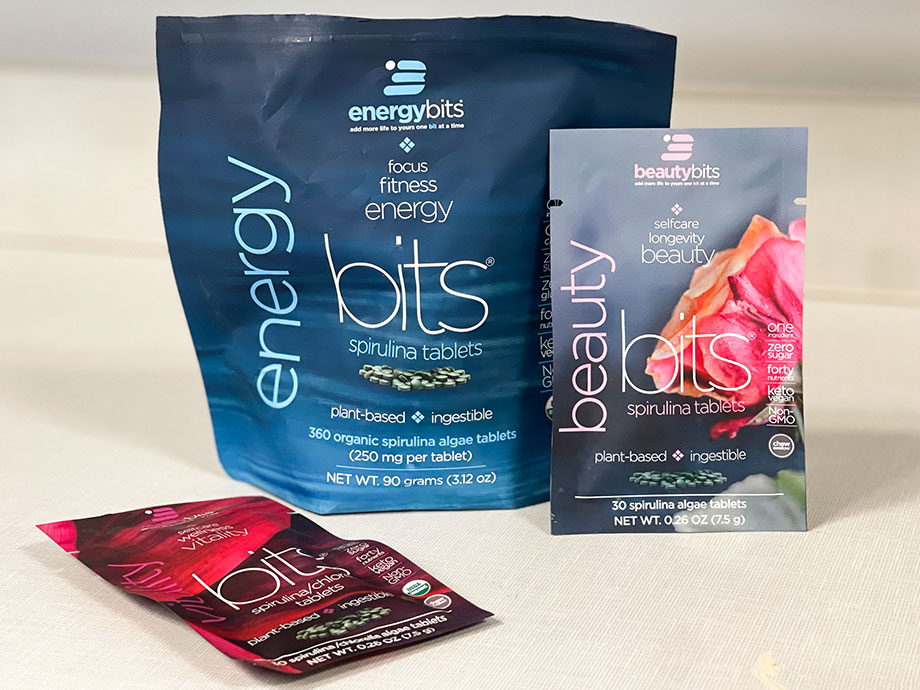
Spirulina grows in fresh and saltwater, contains beneficial compounds like vitamins, minerals, carotenoids, and antioxidants, and is a source of protein and a small amount of carbohydrates. Spirulina also contains:
- Omega-3 fatty acids
- B vitamins
- Magnesium
- Potassium
- Beneficial plant pigments—phycocyanins, chlorella, and beta-carotene—that also give it its blue-green color
8 Potential Health Benefits of Spirulina
From improved exercise performance to decreasing your risk of chronic diseases, spirulina comes with a whole host of health benefits.
1. It’s Loaded with Antioxidants
The antioxidants in spirulina give it its “superfood” designation. Instead of just saying this supplement is loaded with antioxidants, I want to paint the picture for you of how loaded it is.
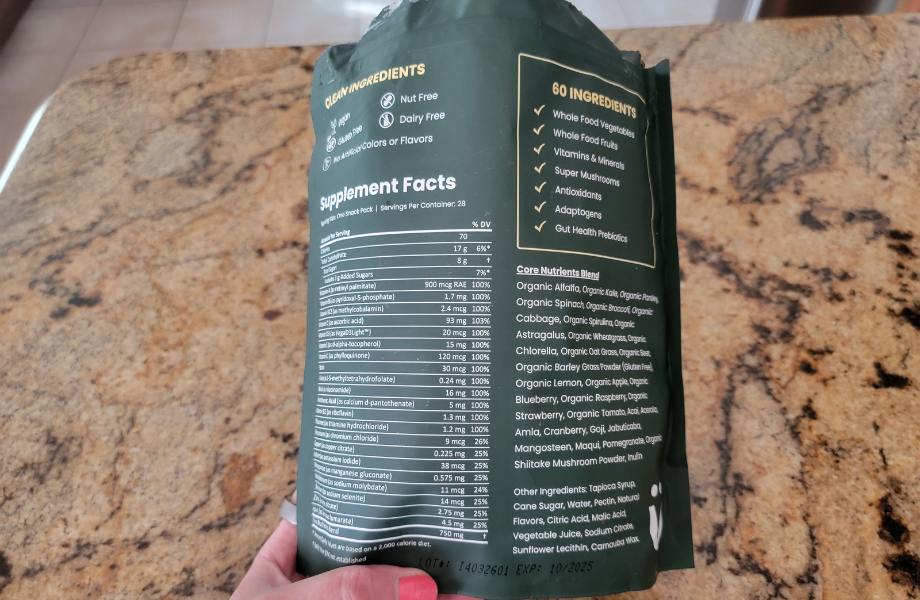
Antioxidant value is measured with an oxygen radical absorbance capacity (ORAC) assay. The higher the ORAC value, the greater the antioxidant activity.
Spirulina has an ORAC value of over 24,0001, which is about 10 times as much as blueberries2 and 300 more than apples3. To put it another way: The FDA recommends consuming 3,000 to 5,000 ORAC units per day4 from plant-based foods. One dose of spirulina, and you’re well beyond that.
RELATED: Best Plant-Based Meal Delivery
But why does this matter? Antioxidants protect your health in a bunch of ways. They can decrease your risk of5:
- Certain cancers
- Neurodegenerative diseases (Alzheimer’s and Parkinson’s disease)
- Eye diseases (macular degeneration and cataracts)
- Heart disease6
- Thyroid diseases
They also fight against biological aging in the brain and body, which means you may feel better and think sharper2.
2. It May Have Ergogenic Properties
Spirulina’s potential ergogenic properties also come from its antioxidant load, but this one deserves its own callout.
Exercise can create a lot of oxidative stress—a situation in which the body has too many free radicals and not enough antioxidants to neutralize them. You can connect this to muscle damage, fatigue, and drops in performance.
RELATED: Best Pre-Workouts
The antioxidants in spirulina help offset this oxidative stress while also increasing oxygen uptake and improving exercise tolerance7. Ultimately, this may help with performance during your workout and post-workout recovery.
There’s also another bucket of research that shows spirulina may improve performance, specifically during high-intensity workouts and resistance training8.
3. It May Help Boost Your Immune System
Spirulina may also regulate your immune system9, helping you fight off parasites, bacteria, and rapid-onset allergies.

For those who do intense exercise, spirulina may protect against post-exercise immune deficiency10 by blocking the resulting increase in T-cells7.
4. It’s Anti-inflammatory
One of spirulina’s most well-documented benefits is that it’s an anti-inflammatory. Chronic inflammation is connected to11:
- Autoimmune diseases, such as rheumatoid arthritis
- Heart disease, such as high blood pressure and heart disease
- GI disorders, like inflammatory bowel disease, Crohn’s disease, and ulcerative colitis
- Asthma
- Depression
- Type 2 diabetes
- Neurodegenerative diseases (Parkinson’s and Alzheimer’s)
- Some cancers
Spirulina can also inhibit the release of histamine12, a chemical released during inflammatory allergic reactions, from mast cells (a type of white blood cell). This can help with allergic rhinitis (hay fever), which causes chronic sneezing, itchy nose and mouth, and runny nose and affects 10% to 30% of the population13.
RELATED: Best Probiotic Supplements
In one placebo-controlled clinical trial14, people with allergic rhinitis were either given a control (placebo) or spirulina for 12 weeks. After the study period, researchers found that a specific allergy marker, interleukin-4, was reduced by 32%.
5. It’s Good for Your Heart
Spirulina has been shown to help improve heart health15 by reducing blood lipids, like total cholesterol, LDL (low-density lipoprotein) cholesterol, and triglycerides, as well as blood pressure. It also increases the “good” cholesterol16, or HDL. This can reduce your risk of heart disease.
In one small study17, researchers gave 4.5 grams of spirulina to 36 men with high blood pressure for six weeks. After the study period, 36% of patients had their blood pressure return to normal, while 50% decreased to prehypertension levels. And that was even without any other changes to their dietary habits or lifestyle during the whole experimental period.
RELATED: Does Cardio Lower Blood Pressure?
6. It May Help Stave Off Type 2 Diabetes
In addition to lowering cholesterol levels (which can contribute to type 2 diabetes), spirulina may also lower fasting blood sugar levels and postprandial blood glucose (blood sugar concentrations following a meal).
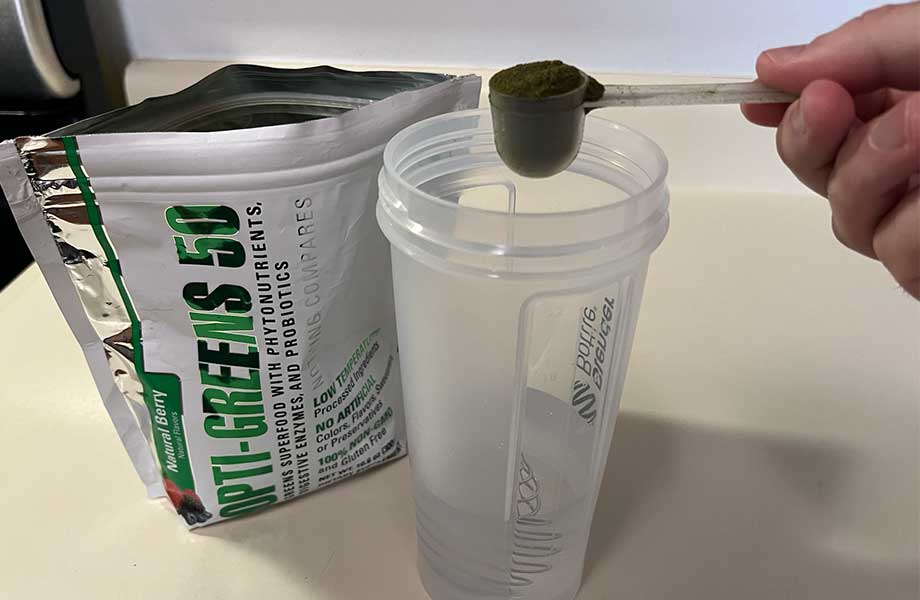
Some older research also showed a significant reduction in A1C levels18 after supplementing with 2 grams of spirulina per day for two months.
7. It May Help with Weight Loss
I don’t want to oversell this one since no single supplement is going to be the answer to your weight loss prayers. Research shows that spirulina may help reduce body fat19, waist circumference, and body mass index (BMI), all while helping control your appetite.
That said, the key to weight loss is staying consistent with a healthy diet and lifestyle.
RELATED: Best Weight Loss Programs
8. It May Have Anti-Cancer Properties
The jury is still out on this one since studies are mixed, but spirulina has also been connected to decreased risk of certain types of cancers.
It may also improve immune function after chemotherapy20, but always make sure to get the all-clear from your oncologist.
Potential Side Effects of Spirulina
Spirulina supplementation is not without its risks, though, but the chances of side effects are slim. When they do happen, the most common potential spirulina side effects21 are:
- Diarrhea
- Bloating
- Upset stomach
- Flatulence
- Edema
- Headache
- Muscle pain
- Facial flushing
- Sweating
That said, like any dietary supplement, you want to make sure you’re choosing one with a clear formula that’s been third-party tested.
Low-quality spirulina powders can be contaminated with heavy metals22, microplastics, and/or microorganisms (bacteria, viruses, fungi). They can also contain microcystins, toxins produced as a result of the living algae trying to defend themselves against predators.
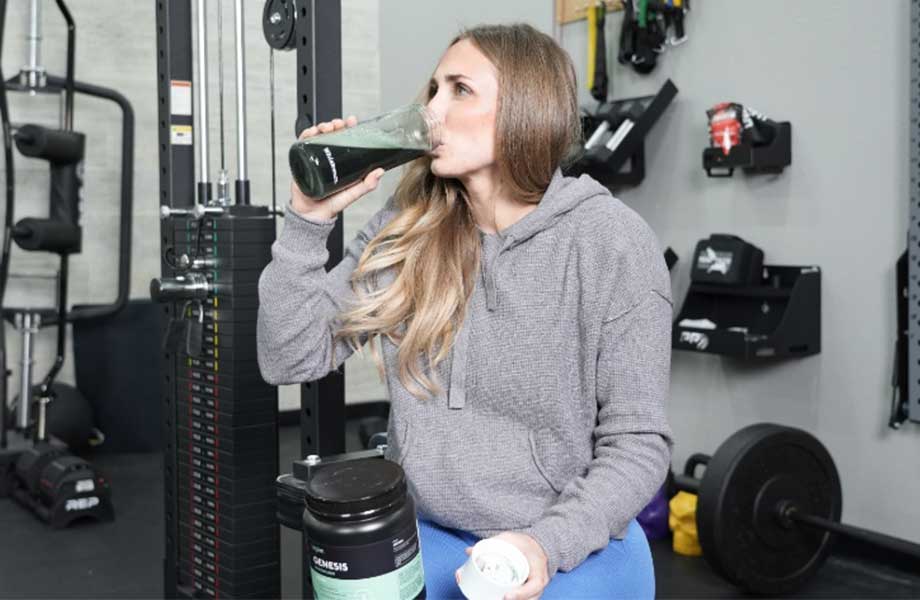
Most reputable spirulina supplements have levels of toxins below the level that would be harmful to healthy adults23. You still want to avoid high doses24, though, as this can make toxicity more likely.
Additionally (and again, like all supplements), spirulina isn’t for everyone. The microalgae is rich in all amino acids, including one called phenylalanine. If you have a condition called phenylketonuria, you should avoid spirulina since your body can’t break down phenylalanine.
Spirulina can also interfere with the way your body uses vitamin A and vitamin E and may interact with some diabetes medications.
Mount Sinai Hospital25 also recommends avoiding spirulina if you have an autoimmune disease, like multiple sclerosis, rheumatoid arthritis, or lupus, since it could potentially make these conditions worse.
If you’re pregnant or breastfeeding, you should also talk to your doctor before taking spirulina.
Benefits of Spirulina: Final Thoughts
Because of its antioxidant effects and anti-inflammatory properties, spirulina is a notable health food. It may reduce the risk of heart disease, type 2 diabetes, and certain types of cancers. It may also improve exercise performance and recovery, especially for those who do high-intensity workouts.
More isn’t better, though—stick to the recommended doses, and you’ll be more likely to reap the benefits without the potential drawbacks.
Benefits of Spirulina: FAQs
What does spirulina do for your body?
Spirulina provides antioxidants, vitamins, minerals, and essential amino acids, which have a protective effect on your health. It may also help reduce inflammation, lower blood lipids and blood sugar, and generally protect your body from biological aging.
Is it safe to take spirulina everyday?
Yes, it’s safe to take spirulina every day. Just make sure you’re sticking to the recommended doses. While the National Institutes of Health (NIH) hasn’t given an official upper limit for spirulina, the American Nutrition Association recommends no more than 10 grams of spirulina per day24.
Can spirulina reduce belly fat?
There’s some evidence that spirulina can help reduce body fat, waist circumference, and body mass index (BMI)19. But it’s not the sole answer to getting rid of belly fat—you need to dial in your nutrition and exercise, too.
RELATED: How To Lose Body Fat
These statements have not been evaluated by the Food and Drug Administration. This product is not intended to diagnose, treat, cure, or prevent any diseases.
References
- Mallamaci R, Storelli MM, Barbarossa A, Messina G, Valenzano A, Meleleo D. Potential Protective Effects of Spirulina (Spirulina platensis) against In Vitro Toxicity Induced by Heavy Metals (Cadmium, Mercury, and Lead) on SH-SY5Y Neuroblastoma Cells. Int J Mol Sci. 2023;24(23):17076.
- High-Orac Foods May Slow Aging. USDA. Accessed September 9, 2024.
- Gemma C, Mesches MH, Sepesi B, Choo K, Holmes DB, Bickford PC. Diets enriched in foods with high antioxidant activity reverse age-induced decreases in cerebellar beta-adrenergic function and increases in proinflammatory cytokines. J Neurosci. 2002;22(14):6114-6120. doi:10.1523/JNEUROSCI.22-14-06114.2002
- Pruteanu LL, Bailey DS, Grădinaru AC, Jäntschi L. The Biochemistry and Effectiveness of Antioxidants in Food, Fruits, and Marine Algae. Antioxidants (Basel). 2023;12(4):860. doi:10.3390/antiox12040860
- Antioxidant Supplements: What You Need to Know. National Center for Complementary and Integrative Health. Accessed September 9, 2024.
- Zujko ME, Witkowska AM. Dietary Antioxidants and Chronic Diseases. Antioxidants (Basel). 2023;12(2):362. doi:10.3390/antiox12020362
- Calella P, Cerullo G, Di Dio M, et al. Antioxidant, anti-inflammatory and immunomodulatory effects of spirulina in exercise and sport: A systematic review. Front Nutr. 2022;9:1048258. doi:10.3389/fnut.2022.1048258
- Acute and Chronic Effects of Antioxidant Supplementation on Exercise Performance. Antioxidants in Sports Nutrition. Accessed September 9, 2024. https://www.ncbi.nlm.nih.gov/books/NBK299045/
- Zhang Y, Zhang Y, Wu W, et al. Effects on Spirulina Supplementation on Immune Cells’ Parameters of Elite College Athletes. Nutrients. 2022;14(20):4346. Published 2022 Oct 17. doi:10.3390/nu14204346
- Peake JM, Neubauer O, Walsh NP, Simpson RJ. Recovery of the immune system after exercise. J Appl Physiol (1985). 2017;122(5):1077-1087. doi:10.1152/japplphysiol.00622.2016
- Inflammation. National Institute of Environmental Health Sciences. Accessed September 9, 2024.
- Karkos PD, Leong SC, Karkos CD, Sivaji N, Assimakopoulos DA. Spirulina in clinical practice: evidence-based human applications. Evid Based Complement Alternat Med. 2011;2011:531053. doi:10.1093/ecam/nen058
- Allergy Statistics. American Academy of Allergy, Asthma & Immunology. Accessed September 9, 2024.
- Mao TK, Van de Water J, Gershwin ME. Effects of a Spirulina-based dietary supplement on cytokine production from allergic rhinitis patients. J Med Food. 2005;8(1):27-30. doi:10.1089/jmf.2005.8.27
- Prete V, Abate AC, Di Pietro P, De Lucia M, Vecchione C, Carrizzo A. Beneficial Effects of Spirulina Supplementation in the Management of Cardiovascular Diseases. Nutrients. 2024;16(5):642. Published 2024 Feb 25. doi:10.3390/nu16050642
- Rahnama I, Arabi SM, Chambari M, et al. The effect of Spirulina supplementation on lipid profile: GRADE-assessed systematic review and dose-response meta-analysis of data from randomized controlled trials. Pharmacol Res. 2023;193:106802. doi:10.1016/j.phrs.2023.106802
- Torres-Duran PV, Ferreira-Hermosillo A, Juarez-Oropeza MA. Antihyperlipemic and antihypertensive effects of Spirulina maxima in an open sample of Mexican population: a preliminary report. Lipids Health Dis. 2007;6:33. Published 2007 Nov 26. doi:10.1186/1476-511X-6-33
- Parikh P, Mani U, Iyer U. Role of Spirulina in the Control of Glycemia and Lipidemia in Type 2 Diabetes Mellitus. J Med Food. 2001;4(4):193-199. doi:10.1089/10966200152744463
- DiNicolantonio JJ, Bhat AG, OKeefe J. Effects of spirulina on weight loss and blood lipids: a review. Open Heart. 2020;7(1):e001003. Published 2020 Mar 8. doi:10.1136/openhrt-2018-001003
- Ge Y, Kang YK, Dong L, Liu LH, An GY. The efficacy of dietary Spirulina as an adjunct to chemotherapy to improve immune function and reduce myelosuppression in patients with malignant tumors. Transl Cancer Res. 2019;8(4):1065-1073. doi:10.21037/tcr.2019.06.13
- Spirulina. In: Drugs and Lactation Database (LactMed®). Bethesda (MD): National Institute of Child Health and Human Development; June 21, 2021.
- Al-Dhabi NA. Heavy metal analysis in commercial Spirulina products for human consumption. Saudi J Biol Sci. 2013;20(4):383-388. doi:10.1016/j.sjbs.2013.04.006
- Rhoades J, Fotiadou S, Paschalidou G, et al. Microbiota and Cyanotoxin Content of Retail Spirulina Supplements and Spirulina Supplemented Foods. Microorganisms. 2023;11(5):1175. doi:10.3390/microorganisms11051175
- Gogna S, Kaur J, Sharma K, et al. Spirulina- An Edible Cyanobacterium with Potential Therapeutic Health Benefits and Toxicological Consequences. J Am Nutr Assoc. 2023;42(6):559-572. doi:10.1080/27697061.2022.2103852
- Spirulina. Mount Sinai Hospital Accessed September 9, 2024.
Further reading

In this Torokhtiy Weightlifting Program review, we have an Olympian try out this Olympian-made program. Read on to see if the program met our expectations. Read more

We picked and tested the seven best smart treadmills for your home gym loaded with Bluetooth technology and interactive programming. Read more

Protein coffee is a fun and tasty way to increase your protein intake while getting your daily caffeine fix. Here's how to make protein coffee you'll enjoy! Read more

REP Fitness has been doing a complete redesign of their power racks and the REP SR-4000 Squat Rack is exactly that. Based on REP’s best-selling rack, the 4000 Series Squat Rack improves in nearly every area and is by far the sturdiest squat stand we’ve tested. There are drawbacks to the design related to the size of its footprint, but if you’re looking for a somewhat budget-friendly squat stand, this is a tremendous option. Read more

